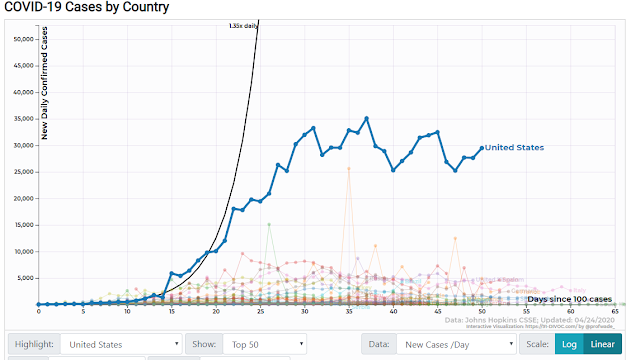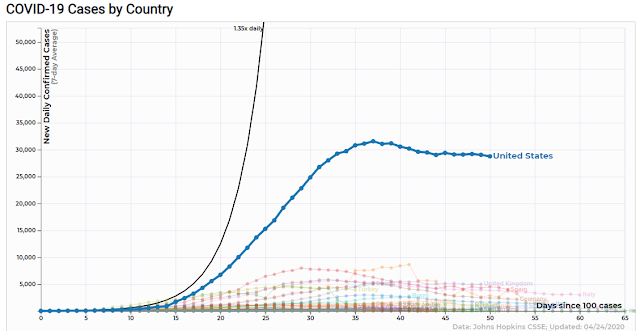So as I’ve said repeatedly, I am not an epidemiologist. This
is just me making my own personal guesses at what may or may not be coming, so
take it with a grain of salt.
I guess first thing’s first – everyone is acting like we’re
all free and clear. That the ‘first wave’ is over, and we just have to worry
about loosening restrictions and creating a second wave. I just… I’m not so
sure I believe that.
Consider this screenshot – to capture what I’m seeing right
now – from this site:
It’s logarithmic, so it shows more the rate of change than
actual progression, but it’s holding fairly steady. Maybe, maybe, a
slight downward trend. Then again, we haven’t really ramped up testing… so how
many of these new cases are just reflecting our current capacity to test rather
than our current number of cases.
Btw, the linear progression looks more like this:
We seem to have some weekly trends – fewer cases on the weekend,
a bump when everyone comes back to work, so it’s sometimes nicer to smooth it
out with a rolling weekly average:
The downward trend does look a little more clear here, but
would I say that the first wave is over?
Not really. These are “new cases per day”, it’s not the
accumulating number of cases. We’re still adding a lot of new cases on a daily
basis. Heck, we seem to be hitting another 100,000 every three days.
So we’ve slowed the exponential growth, but we’re still having
a pretty steady rate of infection. Or rather, our tests are finding that. Who
knows what’s happening with the people who aren’t being tested?
And here’s the thing. The United States is large enough that
we’re not going to have one story of infection. Many of our states are
the size of entire countries, so the story of California or Washington or New
York might reflect the story of Italy or France, but the nation as a whole? We’re
too big, and the responses have been too varied for that.
I use my own personal city as, idk, sort of a benchmark for
this. I’m in Illinois, and Chicago got hit pretty hard.
But I’m downstate from Chicago, and the rest of Illinois is rural
farmland with various sized cities and towns. (And I should count St. Louis, I suppose, since
it straddles the border with Missouri.)
When our governor called for a lockdown, we hadn’t even seen
our first known case of COVID-19.
We now have had 103 cases, 6 of whom are
currently hospitalized, and 5 dead.
Our case history looks something like this:
We had a huge spike in confirmed cases around the 1st
of April, though the infection was probably a few weeks before that. If the chart to the right - cases by the day people started showing symptoms - is showing a lag of about a week for the incubation period, then many of the people who created that spike were infected around the 15th of March.
Right when our
governor ordered a lockdown.
But here’s the thing, then. Chicago got it’s first reported
case at the end of January, so it took what – two months before we started
seeing cases here?
It’s spreading, but slowly. Or, at least, it takes a while before people notice there's an outbreak.
From what I know of the small towns around here, there may
be a similar lag. Oh, in normal times we prob get people coming in to shop or
dine or entertain themselves on a daily basis, but with the lockdown in place
we’re probably seeing it happen less often. Someone might come in for a big
shopping trip at Sam’s Club or something, and stock up for a month.
So the charts I showed for my town… well, that’s probably
comparable to other small cities in states that called for a shelter-in-lace in
the middle of April. The ones that didn’t are probably seeing (or would see,
if they’re testing) more exponential growth.
I don’t know the impact of our collective decisions to
shelter-in-place. It seems like a lot of Americans have voluntarily chosen to
do so, even when their governor and/or mayor hasn’t asked them to.
That’s pretty awesome, actually, and keeps the picture I’m
painting from being as grim as it could be.
Still, I don’t think we’re finished with the first wave.
I
think it’s ebbing in the major cities (and how much of the slight decline is
because New York, the bulk of our cases, is gaining control of their
outbreak?), but that same first wave is only just beginning to reach the smaller
towns.
I wish our news wasn’t so focused on the coasts. I’ve seen
one, maybe two articles talking about exactly this… but everyone else seems to
be breathing a sigh of relief, purely based on what? New York’s numbers?
What do I know, though? As I’ve repeatedly said, I’m not an
epidemiologist. And even though some states were slow to react, quite a few Americans were staying home on their own.
I just wish we’d seen a more definite decline, rather than a
plateau, before people started talking about opening back up.




No comments:
Post a Comment